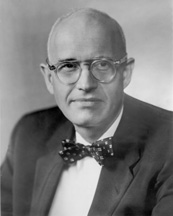Richard L. Neuberger
Richard Lewis Neuberger (born December 26, 1912 in Multnomah County , Oregon , † March 9, 1960 in Portland , Oregon) was an American politician ( Democratic Party ) who represented the state of Oregon in the US Senate .
Richard Neuberger was born in a rural area of Multnomah County and grew up near Portland. He graduated from the University of Oregon in 1935 and was also the editor of the student newspaper Oregon Daily Emerald , which later became a regular newspaper. Neuberger also began writing for the New York Times as a student ; In 1939 he became their correspondent for the American Northwest. He also worked as a book author.
In 1941, Neuberger took on a political mandate for the first time as a member of the Oregon House of Representatives . His career was interrupted by World War II, in which he participated as an officer in the US Army from 1942 to 1945. After retiring from the military, Neuberger returned to work for the New York Times before being elected to the Oregon Senate in 1949 .
Neuberger applied for one of the two seats in Oregon in the US Senate in 1954. He was successful and was elected to this Chamber of Parliament as the first member of his party since 1914. There he belonged to the liberal wing of his faction. One of his important initiatives was the Alaska Mental Health Enabling Act , first introduced in 1956 , which was intended to improve psycho-hygienic care in the Alaska Territory . In 1959, he drafted a bill to create the Oregon Dunes National Recreation Area , a recreation area on the coast of his home state. After the law had been rejected for twelve years, a majority was finally found in 1972.
Richard Neuberger did not experience this anymore. On March 9, 1960, he suffered a stroke, from the consequences of which he died at the age of 47. His wife Maurine , whom he married in 1945, was elected to succeed him; in the meantime Hall S. Lusk assumed the mandate on a provisional basis. The Neuberger Hall at Portland State University is named in honor of the politician.
Web links
- Richard L. Neuberger in the Biographical Directory of the United States Congress (English)
- Richard L. Neuberger in the database of Find a Grave (English)
| personal data | |
|---|---|
| SURNAME | Neuberger, Richard L. |
| ALTERNATIVE NAMES | Neuberger, Richard Lewis (full name) |
| BRIEF DESCRIPTION | American politician |
| DATE OF BIRTH | December 26, 1912 |
| PLACE OF BIRTH | Multnomah County , Oregon |
| DATE OF DEATH | March 9, 1960 |
| Place of death | Portland , Oregon |

